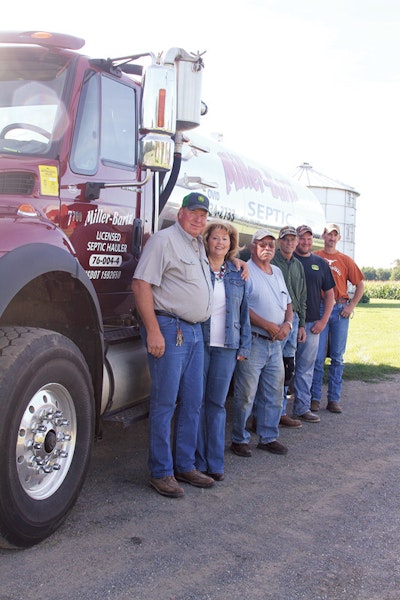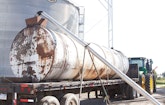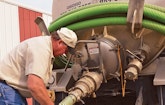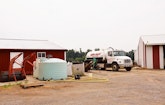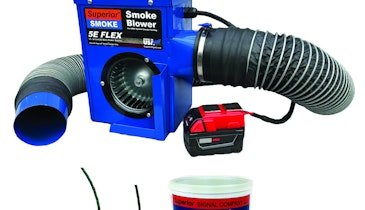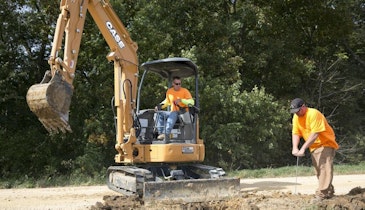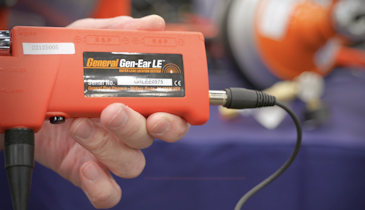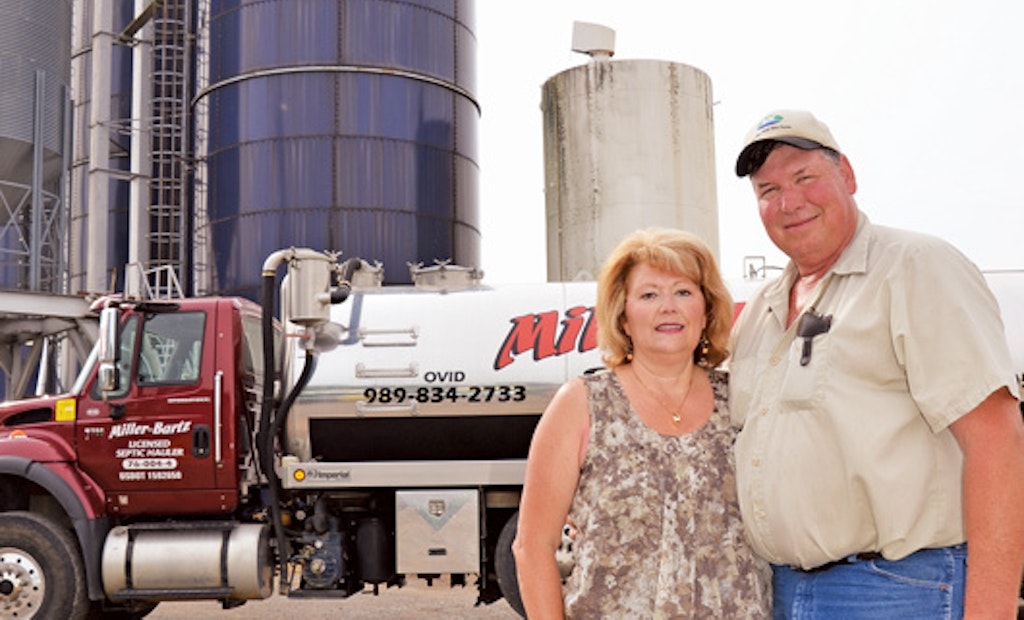
Interested in Pumps?
Get Pumps articles, news and videos right in your inbox! Sign up now.
Pumps + Get AlertsExcept for a couple of vacuum trucks parked by the barn and Miller-Bartz Septic decals on a couple of pickups, Mark and Shannon Hinterman appear to be typical farmers in Durand, Mich.
Like many jack-of-all-trades farmers, the Hintermans run a sideline business – and theirs is a septic service. And a pit beneath the former dairy barn makes it a natural combination. The pit that once held manure from 120 dairy cows now stores up to 200,000 gallons of septage until it can be spread on the Hintermans’ property.
That’s just the beginning. The Hintermans own 1,200 acres including two properties – each with barns that also have 200,000-gallon manure pits – designed by Michigan State University. Though the Hintermans only need about half the 600,000-gallon capacity, the storage areas are key to their septic business and allow room to grow if they choose.
RECOGNIZING OPPORTUNITY
A variety of experiences led to the pumping business, beginning with Mark knowing he wanted to farm at age 5. “Grandpa had farms, and we would do hay. I was with him all summer, and I knew I was happy. I was Grandpa’s shadow,” he recalls. In high school during the early ‘70s, he delivered tractors and equipment for the local John Deere dealership. But like many young men in Michigan, at 19 he got a job at General Motors.
Thirty years later, in 2005, plant closings appeared imminent, and Mark retired. But at 49 he had several irons in the fire. Many years before he had purchased his first 10-acre “farm.” Soon he was baling 550 acres, including neighbors’ land, and by 1991, he and Shannon bought their current farm with 120 dairy cows. In less than two years, they sold the dairy cows and focused on crop farming — along with their full-time jobs.
Mark recognized pumping as an opportunity in 2002, when he read a newspaper article about a new mandate in his county (Shiawassee). Whenever homes were sold, owners would be required to have the septic tanks pumped and the drainfields and wells inspected.
“I figured with the amount of houses being sold in the county, we’ve got to get enough income to make this thing work,” Mark says. “I thought it was a workable business that would go hand-in-hand with my farming operation.”
Instead of starting a new company, the Hintermans purchased Bartz Septic from its retiring owner. Two years later another pumper, Al Miller, contacted them about buying his business. Because both names were respected and familiar, the Hintermans combined them for their business name.
PERFECT FIT FOR FARM
Mark used the manure pit right away, which was fortunate when the state of Michigan Department of Environmental Quality mandated new septage regulations for land spreading in 2004. Land certified for spreading must pass a perk test, be 800 feet from wells, slopes, streams and neighbors, and meet other criteria. Septage must be spread after harvest and before Dec. 15, or after April 1 – which is why the pits are important. The waste is screened to remove plastics and turned under within six hours of spreading.
“We have 40 acres approved by the DEQ and our county health department. We have to pull soil samples every year and send it to the DEQ to let them know we are not over-applying,” Mark explains.
By rotating corn and soybeans (for animal feed), the crops draw down nutrients, allowing spreading on the same acres for a decade. Septage doesn’t have the same potent odor or high level of nutrients as cattle manure, he says, noting the crops don’t do as well as his manure-fertilized crops.
It’s a system that works well for land spreading, Mark says, but one that is set to end in 2025, unless mandates change.
TAKING CHARGE
The Hintermans diligently follow regulations and are members of the Michigan Septic Tank Association. They attend classes to maintain licenses to run the pumping business.
They have a full-time farm employee and two part-time employees for the pumping business. Mark works in both operations and personally handles the land application.
“It’s a bit of a challenge to back up the 8,500-gallon tank with an articulating tractor,” Mark says. “Spreading is a 12-hour job for each pit. I pump and land-apply it in one day.”
The same pump that once moved cattle manure conveys the septage to the tank. He usually empties the pits after fall harvest, and again in the spring before April 1. It takes him about two days each time to spread and work the septage into the approved 40 acres.
Shannon retired after a 25-year career as a nurse to manage the farm and pumping businesses.
“When we bought the pumping business, we had to decide if I should do it or if we should hire someone. I’m more comfortable handling my own money. I like being involved,” Shannon says. She outgrew a spare bedroom office and now works out of the former attached garage converted into a roomy office. She uses QuickBooks for accounting and has a smartphone. With call forwarding, she can answer the phone wherever she is.
“You never get away from it, but the advantage is I’ve got the flexibility. I can work until midnight if I have something to do during the day,” she says.
Mark prepares final scheduling and Shannon usually takes calls from customers, answers questions and makes arrangements for pumping. She has been along on pumping runs with him and understands the business. “It makes a difference who answers the phone, and I’m the first to say she does a better job than I would,” he says.
DOWN-HOME FRIENDLY
Courtesy and friendliness don’t end with Shannon.
“My theory is – and I preach it to my employees – always be customer-friendly and get to know the customers a little bit,” Mark says. Courtesy starts with not bothering neighbors by driving east on the gravel road past them and raising dust. Even when it creates a longer route, Mark and his crew drive a half-mile to the west to a paved road with no neighbors when making runs.
“We try to do same-day service for everybody if at all possible. If calls come after hours, we schedule it the next day,” Mark says. Promptness is a priority.
“We have GPS [in the trucks] and also carry county atlases. The GPS is really nice. If it doesn’t get us to the doorstep, it gets us pretty darn close – and it also gives our arrival time. So if we have to call ahead, the arrival time is to the minute. People love that. A $100 Garmin will pay for itself in a day or two.”
Besides timeliness, Mark stresses thoroughness. That includes raking or whatever it takes to tidy the landscape – and making sure the job is done right.
After opening the tank, the technician stirs the tank manually with a rod and feels the tank walls to make sure it isn’t partitioned. Mark has informed more than one customer they have a tank with multiple chambers after other pumpers have only taken care of one for years.
“In one week recently, we had three people call us back – and no brag, just fact – and tell us how nice our employee was,” Mark says. “That’s what I want to hear.”
The Hintermans make it easy for new customers to find them with signs on their pickup trucks, phone book ads, signs at the county fair, advertising that supports school programs and a website.
THE FLEET
The trucks that came with the businesses have been upgraded or replaced by rigs with larger capacity to pump multiple tanks before returning to off-load at the farm.
A 1999 Freightliner had a 2,200-gallon tank, until Mark had the chassis extended with an additional axle. Now it carries a 3,000-gallon waste/100-gallon freshwater steel Imperial Industries tank. A 2007 International with a quad axle was a milk-hauling truck with just 13,000 miles on the odometer. Mark had the tank replaced with a 4,800-gallon waste/100-gallon freshwater aluminum Imperial tank. Both have Masport 400 pumps.
For land application, Mark pulls an 8,500-gallon steel tank (a used water tank mounted on a flatbed semi trailer with dolly wheels) with a 2013 4WD 9360 John Deere tractor and works the septage in with a 32-foot Case IH disc or a 50-foot John Deere field cultivator. A John Deere pressure washer keeps the trucks and equipment clean.
PUMPING COMES FIRST
With land they own and rent, Mark farms about 3,000 acres of corn, soybeans, wheat and hay. The part-time employees for the pumping business work more hours during planting and harvest time. But when necessary, Mark leaves fieldwork to respond to a call.
“Septic has to come first. Our customers have to be taken care of, and we’ll fill in later with the farm,” he explains.
One group of clients that gets immediate attention are excavating contractors. Quick response has earned the business of all area excavators, and Mark keeps them busy by recommending them to his customers who need repair and installation work. His policy is to suggest the best excavating businesses closest to his customer, so he spreads the work around and keeps all his excavating clients happy.
The Hintermans’ location in the center of the county, the manure pits, land application and the couple’s work ethic have helped the business grow. As Mark predicted, the mandate requiring pumping and inspections on homes sold has created steady work, accounting for about 25 percent of the pumping income.
At 57, and already retired from one career, Mark loves the challenge of farming and pumping.
“It’s part of his genetic makeup,” Shannon says. “If he isn’t being challenged, pushed and stressed, he isn’t happy. He has these goals and come hell or high water, he’s going to achieve them.’’
Mark’s not sure what the future holds, whether anyone in the family will want to take over farming and/or pumping. Or if Michigan’s 2025 ban on land application will remain in place. He hopes he never has to choose between the businesses.
“As long as my health is good and I enjoy it, I want to keep doing both. I question what I like to do more, pumping or farming, but I couldn’t decide. I enjoy meeting people while pumping and I like farming,” he says.
